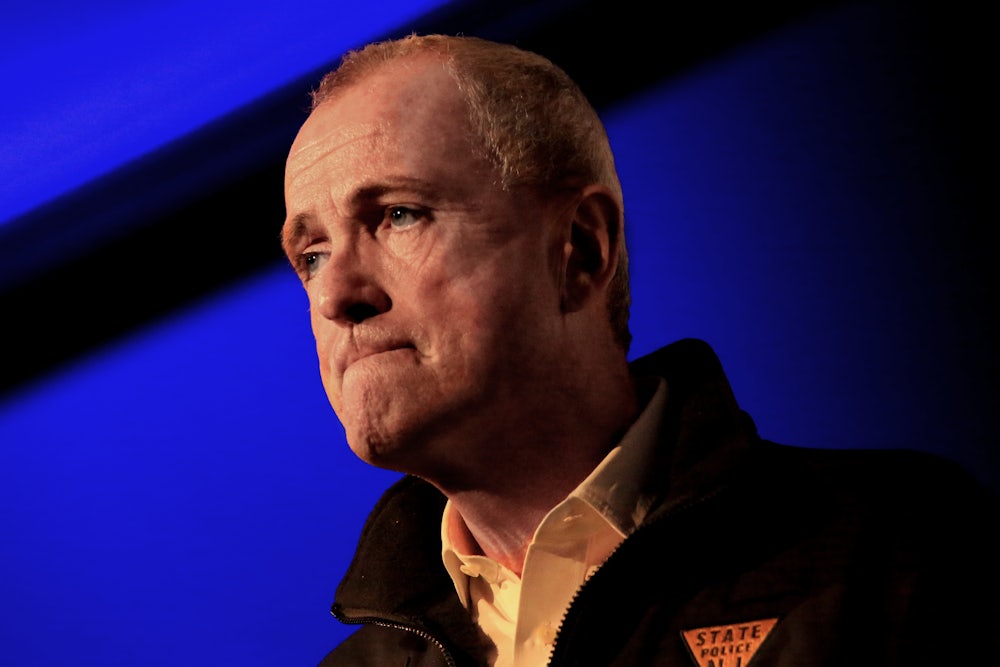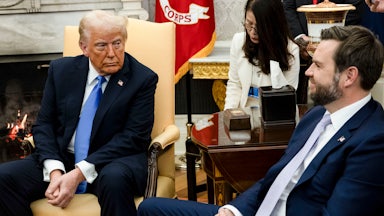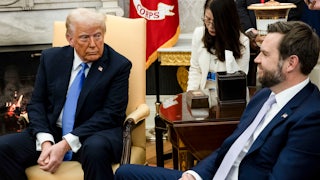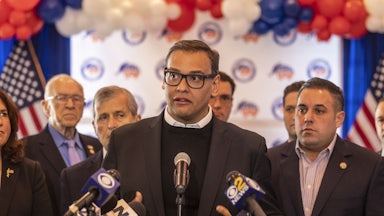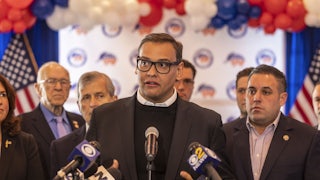This week, The New Republic is launching The Run-Up, a weekly newsletter that takes a deep dive into America’s permanent campaign season. Every Thursday morning, readers will get what they need to stay abreast of what’s happening in key races across the country, learn more about the issues that are animating big political contests, and make more sense of the endless grind of election news.
For our inaugural edition, we talked with New Jersey Governor Phil Murphy, the current vice chair of the Democratic Governors Association and the National Governors Association. Murphy explained how he’ll advise Democrats to talk about abortion if Roe v. Wade is overturned by the Supreme Court, what he would do if he had the chance to do his own reelection campaign over again, and where you might see him out on the campaign trail with his fellow Democrats during the midterms. A condensed transcript of the interview is below.
Grace: The big issue of the hour is abortion. If the federal right to an abortion is overturned, what effect will that have on Democratic candidates, particularly candidates for governor?
Murphy: I think, sadly, and for all the wrong reasons, it will have a significant impact. People are exceedingly upset about this. I never think about this, firstly, through a political lens, but if you do look at it through that lens, abortion rights are supported by the vast majority of Americans, including a significant amount of independent voters, moderate Republicans. We saw when that draft leaked, at least in New Jersey, we saw rallies popping up on literally moments’ notice, with huge turnouts. It will continue to anger folks, especially women, but not just women. I’m not sure that it leapfrogs affordability and opportunity—the sort of kitchen table issues of the day—but it will become a very significant piece of the political landscape. This is a really angering moment. And some of those rallies I mentioned, that were sort of pop-up, instant rallies, were in suburban communities.
Daniel: How would you recommend candidates run on Roe v. Wade being overturned?
Murphy: Again, it’s odious to even be thinking about this as a political matter. But elections have consequences. I think we should be exceedingly forthright about it. I don’t think we should shy away from using the word “abortion.” Hit this squarely on the nose and call it for exactly what it is. I don’t think we should be coy. I don’t think we should be abstract; we should be graphic. Walk through exactly what this means, particularly for women who, for whatever reason—usually economic, usually based on race, sadly—who don’t have the options that other women who are more well off have. I think this is a moment in particular to stand up for women and underserved communities.
Grace: You’re the vice chair of the Democratic Governors Association. What are some of the issues that Democratic governors are facing right now in this midterm cycle?
Murphy: I think overwhelmingly affordability. What are we doing for your kitchen table? Whether that’s gas prices, inflation generally, taxes, health care costs and access. What are we doing to make sure your kids have a better shot than mom and dad have had? In addition to reproductive freedom and abortion, I think guns and gun safety are also on the list. But I think affordability and opportunity. What are you doing to put cash back in my pocket? What are you doing to give everybody, especially my kids, their opportunity, their shot at the American dream? I think the Democrats have a far better story to tell than polls would suggest.
Grace: What is that story?
Murphy: It depends on the state and the race. Laura Kelly, in Kansas, is going after … the grocery tax. Other states are suspending the gas tax. We in New Jersey put forward a historic property tax relief that will become permanent to the tune of $2 billion. And it’s means-tested, so it’s going exactly toward working families. On the opportunity front, prioritizing investment in public education, investment in infrastructure, workforce development, health care, access to health care. I think the story is a very strong one. I think we are the party that stands with working families. And we need to make that crystal clear.
Daniel: Yours was one of two off-year gubernatorial elections, and they did not work out exactly like Democrats expected, although I think your party was much happier with the result in New Jersey than Virginia. What do you think Democrats should take from your narrow win? If I’m a candidate, it seems like a chilling herald for the midterms.
Murphy: I think it was the canary in the coal mine for what we’re seeing this year. We lost a close one in Virginia. We won by 3.3 percent [in New Jersey], so it wasn’t as close as it felt on election night, but it was still closer than I think any of us expected. Remember that movie Network? They’re mad as hell, and they’re not going to take it anymore. Coming out of the pandemic, they’re not sure necessarily why they’re mad or who they’re mad at, but they’re mad. If you’re on the ballot, at least in my case, folks came out because of that, whether it had something to do with me or not.
Daniel: Florida Governor Ron DeSantis in particular: He seems to be able to tap into that.
Murphy: I think that’s right. Secondly, I’m mad at myself for not hitting affordability more squarely. We had 14 middle-class and senior tax cuts in our first term. We should have hit that harder. Back to my point about affordability and opportunity, I think we should shout from the highest mountain the story we’ve got to tell that underpins both of those words, because it’s a good one. Don’t take anything for granted.
Daniel: Campaigns always tell reporters they’re taking nothing for granted.
Murphy: I don’t know that I could have worked longer hours. But if I could have, I would have. A lot of these races will be razor thin, and that’s the takeaway.
Grace: Will you be campaigning with or on behalf of any candidates this cycle?
Murphy: If anybody wants me to, absolutely. Roy Cooper’s the DGA chair, who is terrific. I’m the vice chair. We were just together at an event with Kathy Hochul and Ned Lamont, helping them out. Roy was going to [campaign] with Stacey Abrams tomorrow in Georgia, but he came up with [a] case of Covid, and I was unable to get there. But absolutely. That’s a decision the candidate or the governor makes, not me.
Daniel: Are you planning or hopeful to go down to Georgia and campaign for Abrams?
Murphy: I would love to. I can’t do it this week. But I’m a huge fan of hers. We helped her out last time, and she helped me out last year. [Pennsylvania Attorney General] Josh Shapiro is another guy that I’ve stood beside and worked on in Pennsylvania, by the way.
Daniel: That’s such an interesting race to me because Josh has a huge fundraising advantage over [Republican candidate Doug] Mastriano. Do you think those poll numbers will move more in Shapiro’s direction because of that financial advantage, which is so dramatic, or do you think it’s still going to be close?
Murphy: I think it’ll be close. I hope it moves in the right direction. But I think a landslide in Pennsylvania these days is a couple of points, and as crazy as this guy is, and as good as Josh is, I think there’s a base that Mastriano will have, whether we like it or not. Josh will win that race. He will win it because he laid everything out, but it will be close.
Grace: Are you worried about the strategy, in some races, where some Democratic outside groups are boosting the more extreme right-wing Republican candidates?
Murphy: I haven’t thought about it a whole lot, but I don’t see anything necessarily wrong with it. I think I recall Harry Reid in 2010, or folks who were sympathetic with Harry Reid in 2010, played that card successfully.
Grace: The day after the Uvalde shooting, you said that Republicans are taking blood money from the gun lobby. What spurred you to make that comment?
Murphy: We know that the gun lobby sits between the will of the American people and inaction in Congress. Things like universal background checks, which I think in the last poll was at 88 percent [support], and yet we’ve never been able to accomplish that in Congress. That doesn’t happen by accident. But having said that, they released a package of bills yesterday. I applaud the folks who have come together to at least take that step. As modest as it might be, it’s a step in the right direction.
This interview appears in The Run-Up, a weekly TNR newsletter authored by staff writers Grace Segers and Daniel Strauss. Sign up here.
